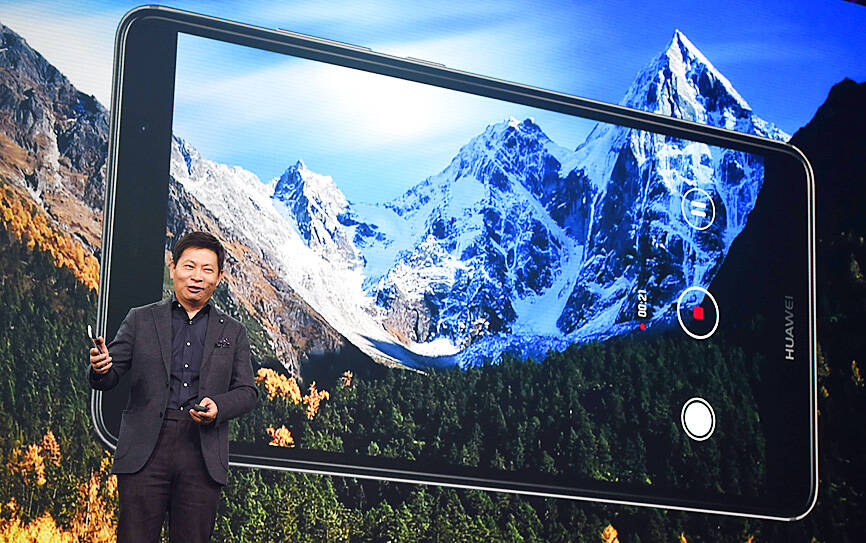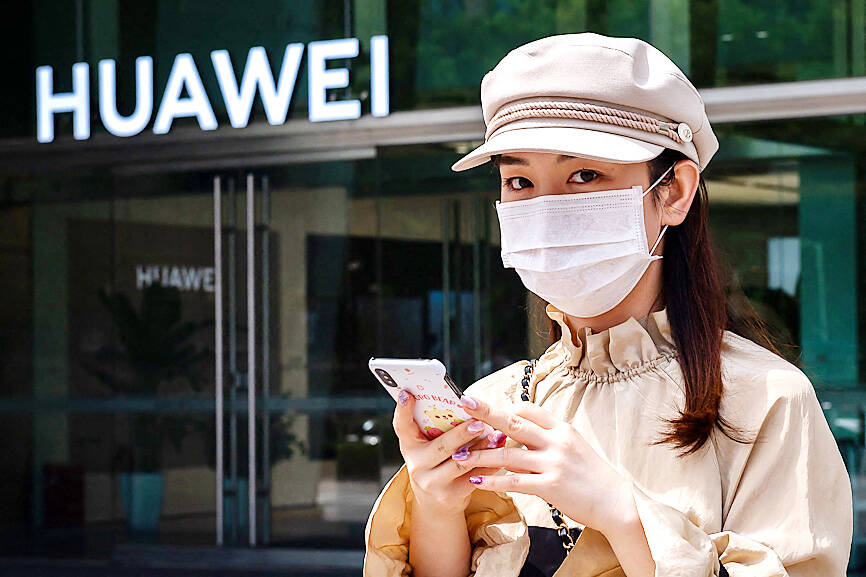The US government has blacklisted Yangtze Memory Technologies Co (長江儲存), Shanghai Micro Electronics Equipment Group Co (上海微電子) and dozens of other Chinese tech companies, ratcheting up a trade conflict between the world’s two largest economies.
The US Department of Commerce placed the companies on its Entity List, meaning that anyone seeking to supply them with US technology would require a license from Washington — something that will likely be difficult to get.
The lineup also includes Pengxinwei IC Manufacturing Co (鵬芯微集成電路). The fledgling chip business is run by a former Huawei Technologies Co (華為) executive and is constructing facilities close to that company’s headquarters, public records and satellite photographs show.

Photo: AFP
Huawei — a company already under strict US sanctions — was expected to buy most, if not all, of the output from that chip factory.
The latest restrictions are part of a push to limit China’s access to advanced chipmaking and artificial intelligence technology, which the US wants to keep away from the Asian nation’s military.
In October, the administration of US President Joe Biden unveiled sweeping measures that limit what US companies can sell to the country — and it has been pushing for allies to go along with the plan.

Photo: AFP
The idea is to severely restrict China’s “ability to leverage artificial intelligence, advanced computing and other powerful, commercially available technologies for military modernization and human rights abuses,” US Undersecretary of Commerce for Industry and Security Alan Estevez said in a statement. “This work will continue, as will our efforts to detect and disrupt Russia’s efforts to obtain necessary items and technologies for its brutal war against Ukraine, including from Iran.”
Yangtze Memory and Shanghai Micro were added to the list out of concern that they would work with companies that the US says pose a risk to national security or support oppression by the Chinese government, including Huawei and Hangzhou Hikvision Digital Technology Co (杭州海康威視).
Yangtze Memory and Shanghai Micro are key to China’s efforts to build a domestic chipmaking industry and wean itself off imports, particularly those from the US.
In all, 36 companies were added to the Entity List in its last overhaul.
ASML RIVAL
Shanghai Micro is China’s leading lithography equipment maker. It is a smaller rival to ASML Holding NV, a Dutch company whose machines are essential to the production of the most advanced chips.
ASML’s technological advantage in that area is currently unmatched by any company anywhere, and the clampdown on Shanghai Micro would make it even less likely that a challenger emerges from China.
Yangtze Memory is a supplier of flash memory chips — the kind of component that stores data in mobile phones and personal computers.
The company was making rapid advances in its production technology, chasing manufacturers such as Samsung Electronics Co, Kioxia Holdings Corp and Micron Technology Inc.
Yangtze Memory had been in talks to supply Apple Inc, which makes virtually all of its iPhones in China. Earlier rules, announced in October, already hurt its access to production machinery. Now the entity listing further hinders its ability to compete.
For Beijing, the export curbs have added pressure to develop a homegrown chipmaking industry. The country has poured tens of billions of US dollars into its domestic capabilities, with mixed results.
Chinese officials are readying a 1 trillion yuan (US$143.5 billion) package to subsidize local chipmakers’ purchase from the nation’s equipment firms, Reuters has reported.
The latest announcement by the US commerce department also expands restrictions on artificial intelligence (AI) technology.
Cambricon Technologies Corp (寒武紀科技) and several of its affiliates, which are developing AI components or systems, were added to the list.

Application-specific integrated circuit designer Faraday Technology Corp (智原) yesterday said that although revenue this quarter would decline 30 percent from last quarter, it retained its full-year forecast of revenue growth of 100 percent. The company attributed the quarterly drop to a slowdown in customers’ production of chips using Faraday’s advanced packaging technology. The company is still confident about its revenue growth this year, given its strong “design-win” — or the projects it won to help customers design their chips, Faraday president Steve Wang (王國雍) told an online earnings conference. “The design-win this year is better than we expected. We believe we will win

Intel Corp chief executive officer Lip-Bu Tan (陳立武) is expected to meet with Taiwanese suppliers next month in conjunction with the opening of the Computex Taipei trade show, supply chain sources said on Monday. The visit, the first for Tan to Taiwan since assuming his new post last month, would be aimed at enhancing Intel’s ties with suppliers in Taiwan as he attempts to help turn around the struggling US chipmaker, the sources said. Tan is to hold a banquet to celebrate Intel’s 40-year presence in Taiwan before Computex opens on May 20 and invite dozens of Taiwanese suppliers to exchange views

Chizuko Kimura has become the first female sushi chef in the world to win a Michelin star, fulfilling a promise she made to her dying husband to continue his legacy. The 54-year-old Japanese chef regained the Michelin star her late husband, Shunei Kimura, won three years ago for their Sushi Shunei restaurant in Paris. For Shunei Kimura, the star was a dream come true. However, the joy was short-lived. He died from cancer just three months later in June 2022. He was 65. The following year, the restaurant in the heart of Montmartre lost its star rating. Chizuko Kimura insisted that the new star is still down

While China’s leaders use their economic and political might to fight US President Donald Trump’s trade war “to the end,” its army of social media soldiers are embarking on a more humorous campaign online. Trump’s tariff blitz has seen Washington and Beijing impose eye-watering duties on imports from the other, fanning a standoff between the economic superpowers that has sparked global recession fears and sent markets into a tailspin. Trump says his policy is a response to years of being “ripped off” by other countries and aims to bring manufacturing to the US, forcing companies to employ US workers. However, China’s online warriors